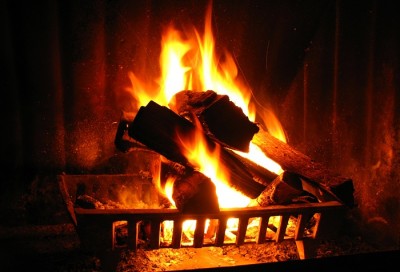Fireplaces could be the next casualty in the growing war on air pollution.
Like many of the wood-burning stoves on the market, fireplaces could be banned or regulated out of existence in the name of clean air and public health. In Utah, the governor in December proposed an all-out ban on wood stoves and fireplaces that would apply to the state’s most populous counties. Those counties have plenty of off-grid homes in rural areas.
“Wood smoke is an extremely toxic, public health hazard,” Brian Moench, the president of Utah Physicians for a Healthy Environment, told The Deseret News prior to the governor’s proposal. “Routine wood burning should not be allowed for the same philosophical, aesthetic and public health reasons as the prohibition of cigarette smoking in public venues.”
Moench said he based his claims upon an Environmental Protection Agency study that found wood smoke was 12 times as toxic as second-hand cigarette smoke.
The Utah Air Quality Control Board and Division of Air Quality considered such a ban before tabling it following outrage by citizens.
“We are going down a slippery slope if the government does this ban without compromise,” opponent Steve Pohlman said. “Why don’t they just ban all cars from driving?”
The Most Versatile Backup Stove In The World Allows You To Cook Anything, Any Time, Any Where
The ban is designed to get Utah into compliance with federal air quality standards for fine particulate pollution. Wood smoke accounts for about 4 percent of the emissions, according to EPA estimates cited by media outlets. That figure was quoted often by wood stove and fireplace owners, who asked: Why is the state going after homeowners and not going after big industries?
Wood burning is already banned in parts of Utah on low air quality days. Even EPA-approved stoves would have been prohibited. Homeowners who use only wood for heating their homes would have been exempt, but that did not appease residents.
“How is this going to be enforced?” opponent Aaron Holt asked. “Neighbor turning in neighbor? It took me five years to buy my stove because I wanted to be part of the solution, not the problem.”
Opponents of the ban were upset because it would have affected not only urban residents but rural ones, too.
“I don’t even see an inversion where I live, yet you don’t want me to burn a wood stove,” opponent William Hogan complained, referencing the term for when polluted air gets trapped close to the ground.
An organization called Utahns for Responsible Burning lobbied against the ban.
Fireplaces Have Been Banned Elsewhere
Periodic bans on fireplaces are already in effect in places such as Southern California, where the Air County Management District banned all wood burning in Los Angeles, Orange County, Riverside and San Bernardino, on seven days in January.
One city has gone even further.
All residents of the city of Montreal will be required to remove wood-burning stoves or fireplaces or replace them with gas-burning heaters by 2020, CTV News reported. The installation of wood-burning stoves and fireplaces in new Montreal homes has been illegal since 2009.
Elsewhere, France’s Ecology Minister, Ségolène Royal, said he would overturn a ban on wood-burning in the region around Paris. Royal called the ban which was designed to end air pollution “ridiculous.” The ban was put in place by regional authorities.
In the U.S. new EPA regulations set to go into effect will ban the manufacture and sell of most wood stoves on the market in the US. Fireplaces are specifically exempt from those regulations. Yet they are affected by other regulations.
“I think this will affect my ability to be self-reliant,” Holt said of the proposed ban in Utah.
Opponent Darrell Holden noted: “Wood is a renewable resource. Why … are we banning something that we don’t have to pump out of the ground?”
Do you believe there is a “war” on wood-burning? Share your thoughts in the section below:
 Off The Grid News Better Ideas For Off The Grid Living
Off The Grid News Better Ideas For Off The Grid Living




